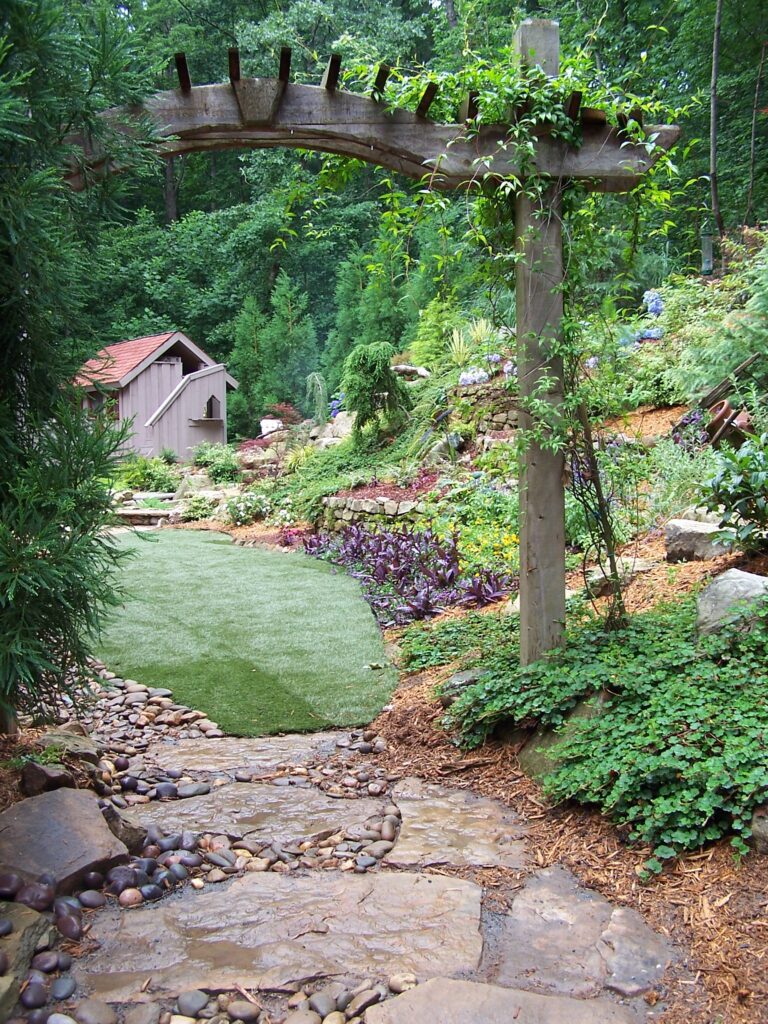In the world of landscaping and gardening, soil holds the secrets to a vibrant, flourishing yard. Whether you’re cultivating a lush lawn, nurturing beautiful trees, or gardening delicate flowers to bloom, understanding and tending to the soil’s needs is paramount. In our comprehensive guide, P.O.P.S. Landscaping will discuss the essentials of soil testing, fertilizing, and mulching to ensure your outdoor space thrives with bountiful beauty and strength.


The Landscaping Secrets of Soil Testing
Before starting your gardening journey, it’s important to know the mysteries hidden beneath the surface. Soil testing serves as the compass, guiding you towards optimal growing conditions. By analyzing the pH levels, nutrient composition, and texture of the soil, you gain invaluable insights into its fertility and structure.
pH levels dictate the soil’s acidity or alkalinity, influencing nutrient availability and plant growth. Most plants thrive in slightly acidic to neutral soil, with a pH range of 6.0 to 7.0. However, certain species have specific pH preferences. To conduct a soil pH test, you can utilize DIY kits available or enlist the services of P.O.P.S. Landscaping for a more comprehensive analysis. Once you obtain the pH reading, you can adjust it accordingly to meet the requirements of your desired plants.
Nutrient deficiencies can hurt plant growth and vitality, manifesting in stunted development and poor foliage. Through soil testing, deficiencies in essential elements like nitrogen, phosphorus, and potassium can be identified and rectified with targeted strategies.
Soil texture, ranging from sandy to clayey, profoundly impacts drainage, aeration, and root development. Understanding your soil’s texture allows for appropriate landscaping maintenance to optimize its structure for plant growth. Sandy soils drain quickly but may lack nutrients, while clay soils retain moisture but can become waterlogged. Adding organic matter like compost or aged manure can improve soil structure and fertility for both soil types.
From soil testing, you can embark on a journey of nurturing your soil to its fullest potential this season.


The Role of Fertilizers in Landscaping
Fertilizers are the lifeblood of your garden, enriching the soil with the nutrients necessary. While soil naturally contains essential elements, intensive cultivation and harvesting deplete these reserves over time, necessitating supplemental fertilization.
Nitrogen, phosphorus, and potassium are the primary nutrients essential for plant health. Nitrogen fuels leafy growth, phosphorus stimulates root development and flowering, while potassium fortifies plants against disease and stress.
Choosing the right fertilizer formulation depends on your soil test results and the specific needs of your plants. Nitrogen-rich fertilizers like urea or ammonium sulfate are ideal for promoting beautiful foliage, while phosphorus-heavy fertilizers are beneficial for flowering and fruiting plants. Potassium can be supplied through potassium sulfate or potassium chloride, aiding in overall plant health and disease resistance.
However, the indiscriminate application of fertilizers can have adverse consequences, including nutrient runoff polluting waterways and soil degradation. To optimize efficiency and minimize environmental impact, contact P.O.P.S. Landscaping for all your soil’s needs.
An often-overlooked aspect of fertilization is the distribution around the perimeter of plants, rather than solely at the trunk. This encourages roots to spread laterally, anchoring plants securely and enhancing their resilience against environmental stresses. By nurturing a robust root system, plants are better equipped to access water and nutrients, fostering vigorous growth and longevity.
Furthermore, the timing of fertilizer application is crucial for maximizing its efficacy. During the growing season, plants have heightened nutrient demands to support their rapid growth and development. P.O.P.S. Landscaping can schedule fertilizer applications to coincide with peak growth periods, providing plants with the fuel they need to thrive.
Mulching: Natures Blanket
In the southern heat, moisture becomes a needed commodity. Enter mulching, nature’s ingenious solution to combating moisture loss and regulating soil temperature. Mulch acts as a protective barrier, shielding the soil from the scorching sun and reducing water evaporation. By conserving moisture and moderating temperature fluctuations, mulch provides a lifeline for plants.
Beyond moisture retention, mulch offers several benefits, including weed suppression, erosion control, and soil enrichment. As organic mulch decomposes, it contributes valuable organic matter to the soil, enhancing fertility and structure over time.
When mulching, ensure a layer thickness of 2-4 inches, taking care to leave a small gap around plant stems to prevent rot and fungal diseases. Opt for organic mulch materials like shredded leaves, wood chips, or compost, which gradually break down, nourishing the soil as they decompose.
In addition to its benefits, mulch adds aesthetic appeal to your landscape, providing a cohesive backdrop for your plants to shine. With a myriad of colors and textures to choose from, mulch allows you to customize your garden’s aesthetic while enhancing its health and vitality.


Need Landscaping? Call Us Today!
Cultivating a beautiful yard is a blend of art and science. By embracing the principles of soil testing, precision fertilization, and mulching, you empower your garden to thrive with glowing beauty and unwavering strength. So, start your journey, dig into the earth, and let your gardening begin. With each carefully tended seedling and meticulously applied layer of mulch, you’ll witness your outdoor space blossom into a vibrant oasis of life and tranquility. Call us today to learn more about pricing and our landscaping services.



